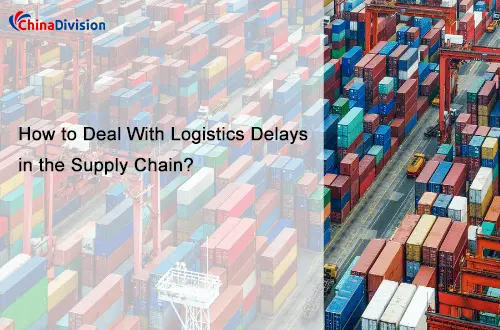How to Deal With Logistics Delays in the Supply Chain?
Logistics delays have become a pain point that is difficult to avoid in the supply chain. From cargo stranded at customs to temporary flight cancellations, from port congestion to transportation tool failures, every delay may trigger a chain reaction, leading to customer complaints, inventory backlogs and even capital chain breaks. World Bank 2024 data shows that on average, each cross-border e-commerce order loses 23% of profit due to logistics delays.
Table of Contents
As a service provider who has been deeply involved in the field of international logistics for many years, Chinadivision will systematically dismantle the causes of logistics delays for you through this article and provide solutions that can be directly implemented.
What are the reasons for logistics delays?
Force majeure factors
Extreme weather (such as typhoons and blizzards) leads to port closures or flight cancellations; natural disasters (such as earthquakes and floods) damage infrastructure and interrupt transportation.
Transportation tool failure
Failures of transportation tools such as freight ships, airplanes or trucks may cause transportation interruptions or delays.
Customs clearance bottleneck
Factors such as cumbersome customs clearance procedures and incomplete documents may cause goods to be detained at customs, delaying logistics time. Sensitive goods (such as powders, liquids, and live products) have a higher inspection rate; incorrect declaration information (such as inconsistent product names, underreported values) triggers manual review. Delays caused by customs clearance documents: 32% of delays are due to HS code errors, 28% are due to commercial invoice amounts that do not match the actual goods, and 17% lack special certifications required by the destination country (such as EU CE standards and US FDA certification).

Logistics peak and resource shortages
During e-commerce promotions (such as Black Friday and Prime Day), ports are congested and flights are full; transportation tools (such as freighters and cargo planes) suddenly fail or scheduling is delayed. For example: During Black Friday in 2023, the average detention time of containers at the Port of Los Angeles soared from 3 days to 11 days, and sea freight prices soared by 300%. What's more fatal is that 54% of sellers have goods stranded at the port of departure because they did not book space in advance.
Broken collaboration between suppliers and logistics providers
Low production efficiency of suppliers, supply chain disruptions or untimely delivery can lead to logistics delays. Or the goods provided do not meet quality standards and need to be reworked or re-produced, which can also lead to delays. Suppliers' delayed delivery disrupts transportation plans; logistics providers' operational errors (such as labeling errors, sorting errors) cause secondary delays.
Policy and compliance risks
Sudden changes in the destination country's policies (such as additional tariffs, temporary bans); goods lack certification documents (such as CPC certificates, FDA certification).
Information asymmetry
Asymmetric logistics information and poor communication make it impossible for companies to adjust and respond in time.
Improper inventory management
Insufficient or excessive inventory will cause an imbalance between supply and demand, thereby affecting the timeliness of logistics.
What measures can be taken to deal with logistics delays?
Advance planning and forecasting
Establish multiple logistics channels, plan alternative routes in advance, and choose service providers with multimodal transport capabilities, such as Chinadivision's "sea-air transport" solution, which can quickly switch transportation modes in extreme weather.
Effective inventory management
Adopt a dynamic inventory management system to adjust inventory levels based on real-time data to ensure a balance between supply and demand. Set a reasonable safety stock level to cope with supply chain disruptions or sudden demand.
Complete customs declaration documents
Prepare sufficient documents and ensure that all necessary customs declaration documents are complete and accurate, which can effectively reduce delays caused by incomplete procedures. Automatically verify the declaration information and document integrity to reduce human errors.
Strengthen customs clearance management
Work with a professional customs clearance team to confirm the compliance of goods in advance. Chinadivision provides "pre-clearance services" to predict customs risks through big data analysis and shorten customs clearance time.
Use smart logistics technology
Disperse delivery time and avoid centralized stocking. Chinadivision's "smart warehouse system" can automatically allocate orders to the best warehouse to reduce the pressure on a single node.
Choose a reliable logistics partner
Choose a service provider with full-link control capabilities. Chinadivision achieves real-time data synchronization from factory to warehouse through the "supplier collaboration platform" and is equipped with a 7×24-hour abnormal response team.
Common questions and answers about logistics delays
How to resolve customer complaints caused by logistics delays?
Proactively inform customers of the cause of delay and the estimated time to resolve; provide compensation solutions (such as coupons, free expedited delivery); automatically push logistics dynamics through Chinadivision's "Customer Notification System" to reduce manual communication costs.
How to deal with logistics delays during peak seasons?
Set reasonable transportation time in advance, considering how to deal with possible delays. Regularly evaluate and adjust supply chain management to ensure the efficiency of partners and transportation routes.
How to reduce delays caused by problems on the recipient side?
Provide a detailed guide to filling in recipient information on the order confirmation page to ensure that the recipient can provide the required information in a timely manner. For high-risk areas for customs clearance, adopt the "pre-declaration + local return and exchange warehouse" model, and customers can choose to wait for customs clearance or directly receive replacement goods in the local warehouse.
Join hands with Chinadivision to build a resilient supply chain
As a professional international logistics service provider, Chinadivision provides comprehensive logistics solutions to help your company effectively deal with logistics delays in the supply chain. From the perspective of a professional international logistics service provider, ChinaDivision provides practical solutions to minimize logistics disruptions and help you stay ahead in the global supply chain. If you have any questions or need further information about our services, please feel free to contact us.





